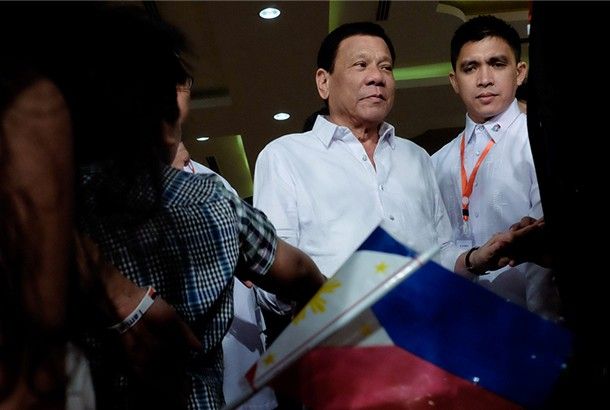DFA: Philippines keeping close watch on Scarborough Shoal
March 22, 2017 | 3:34pm

President Rodrigo Duterte gets a warm welcome from supporters upon his arrival at the Horizon Lake View Hotel in Nay Pyi Taw, Myanmar on March 19, 2017 for a meeting with the Filipino community.
Rene Lumawag / Presidential Photo
BANGKOK — The Philippines is keeping a close watch over Panatag (Scarborough) Shoal as it verifies reports that China is eyeing to construct a monitoring station on the disputed area.
Acting Foreign Affairs Secretary Enrique Manalo could not say whether the Philippines would file a protest against China’s reported plan to build an environmental station in Panatag, a traditional fishing ground located off the coast of Zambales.
He said the Philippines has asked China to clarify the reported plan early this week.
“We have already approached China to seek clarification on this reported plan. And we have to wait for China’s reply,” Manalo said.
“In the meantime, we are maintaining a close watch on the Scarborough Shoal. So we would be aware of any development in the area. So I think at this stage, that’s all I want to say on your particular question,” he added.
Panatag Shoal is situated 124 nautical miles off Zambales and is within the Philippines’ exclusive economic zone. China started occupying the shoal in 2012 when it barred the Philippine Navy from arresting Chinese poachers who harvested endangered species.
Reports have quoted a Chinese official as saying that China would begin this year the preparations for the building of environmental monitoring station on the Panatag Shoal. Xiao Jie, the mayor of what China calls Sansha City, said the monitoring station is included in the Chinese government’s projects lined up for this year.
Sansha is the name given by China to the municipal government that administers several island groups including disputed areas like the Spratly Islands and the Panatag Shoal.
Philippine s to file a strong protest
While Malacañang is still verifying the report, Justice Secretary Vitaliano Aguirre said in an interview on Tuesday that the Philippines is preparing to file a strong protest.
President Rodrigo Duterte has said that no one can stop China from carrying out its plan, noting that even the United States, which has advanced military equipment, was not able to do so.
“So what do you want me to do? Declare war against China?” Duterte said in a press briefing last Sunday.
“I can but we’ll lose all our military and policemen tomorrow, and we are a destroyed nation. And we cannot assert even a single sentence of any provision that we signed.”
Manalo said the Philippines remains committed to a peaceful settlement of disputes in the region but remains committed to defending the country’s national interests.
“But in the meantime, we are seeking diplomatic and peaceful settlement of disputes. That’s one of the reasons we are pushing very hard for this Code of Conduct,” the acting foreign affairs chief said.
“But in a way also, we’ll be having a chance to talk with China face to face on issues of the South China Sea. We have agreed to establish bilateral mechanism with China to discuss issues on the South China Sea,” he added.
“So I think the president has been very clear. We want to have a peaceful, diplomatic settlement of disputes but we will not fail to protect our national interest if necessary.”
In 2002, the Association of Southeast Asian Nations (ASEAN) and China signed the Declaration on the Conduct of Parties in the South China Sea to settle maritime disputes peacefully. It has been fourteen years since the declaration was signed yet the parties have not crafted a binding code of conduct.
During their bilateral meeting Tuesday, Duterte and Thai Prime Minister General Prayut Chan-o-cha expressed hopes that a framework for the code of conduct would be completed within the year.
“The importance of the framework is that if it is completed, it will identify the key elements of a Code of Conduct and that is possible because once we have a framework, it would then be possible to actually begin a series of discussions on a Code of Conduct on the basis of a framework,” Manalo said.
Manalo said China has mentioned the importance of coming up with a framework for the code of conduct for South China Sea claimants.
“I’m pretty sure that the guiding elements there would be how to promote cooperation and how to de-escalate tension even in the light of perhaps existing disputes. And maybe, once that’s all clear, once we have a code, we may actually now be in a position to actually discuss how we can settle the disputes,” Manalo said.
“I think China also has to be cooperative when we negotiate the framework. We’ll have to take into account the concerns of all the other countries in the framework,” he added.
BrandSpace Articles
<
>
Philstar
- Latest
- Trending
Trending
Latest





























